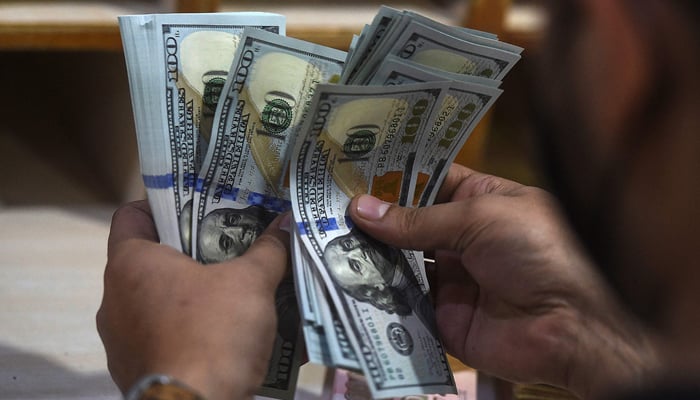SBP reserves shoot past $8 billion mark after nine months
SBP-held reserve position is the highest since October 2022 when the country had $8.9 billion in reserves
The State Bank of Pakistan (SBP) held reserves shot past the $8 billion mark on Thursday after a gap of nine months as Pakistan received inflows from the International Monetary Fund (IMF), United Arab Emirates (UAE) and Saudi Arabia.
As per a statement issued by the central bank, the total liquid foreign reserves held by Pakistan stood at $14.06 billion for the week that ended on July 14.
Out of the amount the SBP reserves are at $8.7 billion and the reserves held by commercial banks are at $5.3 billion.
“During the week ended on 14 July 2023, the SBP received $2 billion from the Kingdom of Saudi Arabia, $1.2 billion from IMF, and $1 billion from the (UAE). Consequently, the SBP reserves increased by $4.203 billion to $8.727 billion,” the statement said.
As Arif Habib Limited, with the inflows it means that Pakistan has an import cover of more than two months now. It also added that the SBP’s reserve position is the highest since October 2022 when the country had $8.9 billion in reserves.
Pakistan’s $350 billion economy was in turmoil since November when a $1.1 billion IMF tranche, part of a $6.5 billion Extended Fund Facility (EFF) agreed upon in 2019, was held by the Washington-based lender.
The government was in talks since end-January to resume the programme but it could not be resurrected and the programme ended without completion. Since then there had been persistent talks of the country defaulting.
However, the tide turned on June 30, the last day of the EFF, when Pakistan and IMF reached a long-awaited staff-level agreement (SLA) on a $3 billion “stand-by arrangement” (SBA).
Following the agreement inflows started to come to Islamabad from Saudi Arabia on July 11 and the UAE on July 18.
While the IMF’s Executive Board approved the 9-month SBA on July 12.
Multilateral and bilateral funds were a major obstacle in the way of Pakistan's deal with the IMF — which remained stalled for more than nine months and expired.
With sky-high inflation and foreign exchange reserves barely enough for a month of controlled imports, analysts say Pakistan's economic crisis could have spiralled into a debt default in the absence of the IMF bailout.
-
Will Warner Bros finalize deal with Paramount or stays loyal with Netflix's offer?
-
$44 billion Bitcoin blunder: Bithumb exchange apologizes for accidental payout
-
Global memory chip crunch puts spotlight on Apple; Will iPhone become more pricey?
-
Bitcoin plummets toward $60,000 as investors dump risky bets
-
Bitcoin crashes below $63K as regulatory pressure and market fears grow
-
Bitwise Crypto Industry innovators ETF: What investors should do in 2026?
-
Nintendo shares slide again as momentum fears grow
-
Gold, silver prices fallen sharply; What’s driving the drop?













